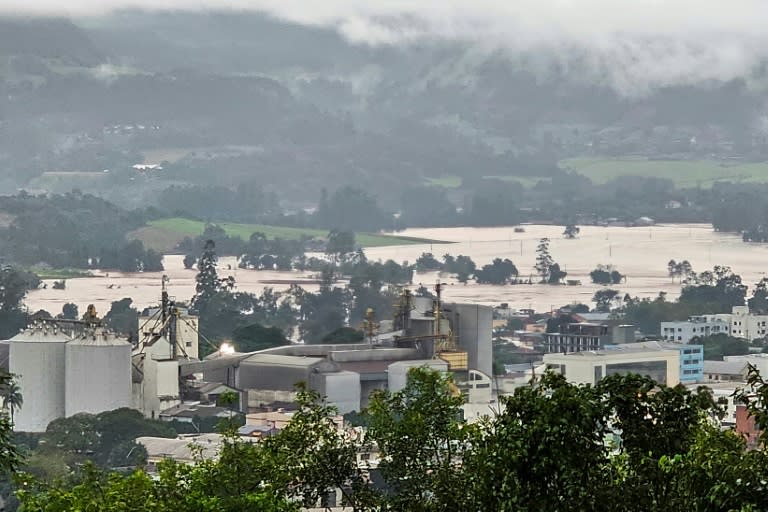Flood-hit Brazil businesses count losses, look to future

The thriving economy of southern Brazil has been brought to its knees by historic floods, with vast agricultural land unusable and factories paralyzed.
Even as businesses tally the full extent of the damages, they are clamoring for aid to help them bounce back, and measures to deal with future extreme climate events.
"No one has had losses like we are seeing now," said Gedeao Pereira, president of the Federation of Farmers of Rio Grande do Sul (Farsul).
"There is widespread destruction, mainly in the central regions of the state," he told a press conference.
Historic floods that have lasted a month, attributed by experts to climate change exacerbated by El Nino, left 169 dead and some 600,000 displaced.
AFP looks at some of the main challenges facing businesses in Rio Grande do Sul, one of Brazil's richest states:
- Counting costs -
The main industries in the region are agriculture and manufacturing.
According to a local industry federation, nine out of 10 factories in the state have been affected by the flooding.
A preliminary survey published by Farsul estimates that large landowners lost up to 25 million reais ($5 million).
However, with waters still receding, the true cost of damage in the region of 11 million inhabitants has yet to be calculated.
"As we continue to visit the state, we are increasingly struck by the level of damage," said Pereira.
- Restoring transport -
Multiple bridges collapsed in the flooding and roads are in a dire state, making the transportation of goods extremely difficult.
"The most pressing thing is to restore mobility," said Angelo Fontana, president of the Chamber of Industry, Commerce and Services of the Taquari Valley, a badly affected region northwest of the capital, Porto Alegre.
He told AFP this would be the first step to get companies back on their feet.
Fontana is a partner in a 90-year-old firm of the same name, which manufactures chemical products in the town of Encantado, alongside the Taquari River.
The company, which employs 250 people, has yet to resume production after several of its immense chemical tanks were left leaning precariously like towers of Pisa from the force of the water.
- More financial assistance -
The federal government has announced, among other measures, a line of credit of 15 billion reais ($2.9 billion) with low interest rates and the option to renegotiate existing debt.
However, Pereira told AFP that "longer repayment periods, up to 20 years" were needed.
The aid is "positive, but more loans are needed" for producers, said Carlos Joel da Silva, president of the state's agricultural workers federation, which represents more than 700,000 employees on small-scale farms.
Just treating farmland to make it fertile again is extremely costly, he added.
- Contingency plans -
The region has suffered four extreme weather events in the past year, and businesses say it is time for contingency plans to face up to the changing climate.
The Fontana company drew up such a plan after flooding in 2023.
This time, when torrential rains were forecast, "we removed equipment and electronic components from our machines," said Ricardo Fontana, director of the company. "This way, we limit the damage."
- Risk of workers exodus -
Angelo Fontana said almost 10 percent of his company's employees have asked to quit since the floods, pointing to the risk of an "exodus of workers" in the region.
"We must give them a solution for housing, stability," he said.
The threat of extreme weather events may push some to abandon their businesses entirely.
Da Silva, of the agricultural workers federation, said small producers who had barely recovered from several years of drought might be forced to "seek new lands."
Alexandre Becker, a dairy farmer in the Taquari Valley who lost much of his cattle's feed, said he would get rid of some of his herd.
"If the winter doesn't go well for us, the way things are going this year we don't rule out" quitting the business, he said.
app-ll/fb/acb


